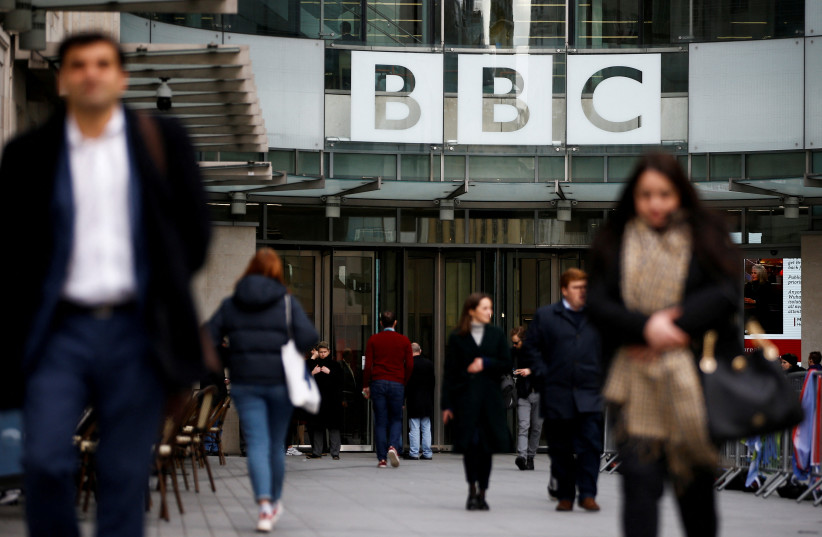BBC Arabic has published several videos featuring songs that celebrate violent attacks on Jews and continues to host guests whose discourse is greatly antisemitic.
In a video from May, the BBC Xtra series aired the performance of a folk song that celebrates martyrdom and encourages armed attacks against Israelis.
The first lines of the song ask the audience "who except you" can fight against the "usurper" and "aggressor?" The song continues, saying, "the force in your hand is your right... don't leave your weapon in its sheath... your blood, should it be shed on your soil, would make red freedom bloom."
The lyrics that follow suggest that the kind of militant action the song promotes is not merely intended to expel Israelis from the West Bank but from all of Israel. "We did not forget Jerusalem and Ramallah... we did not forget your earth... from Acre to Gaza to your deep valleys, from your Mediterranean Sea to your mountains we do not forget your soil."
The video was broadcast on “Nakba Day.” The Nakba, meaning "catastrophe" in Arabic, refers to the birth of the State of Israel and the exodus and expulsion of many Arabs during the 1948 war waged by a coalition of Arab armies intending to destroy the nascent Jewish state when it declared independence.

Then, in October of this year, the BBC Arabic program Dunyana aired another folk song.
Dunyana, Arabic for "our world" is a BBC Arabic program for women that, according to their Twitter account, covers "current affairs and social issues."
The song that the program aired, entitled, "Mother, There’s a Knock at Our Door," is about a militant carrying out attacks on Israelis coming home and knocking on their mothers' doors. It was sung by Mira Sidawi, a frequent contributor and occasional host on the program.
The Jewish Chronicle reported that the lyrics, translated from Arabic to English, include, “mother, there’s a knock on our door; mother, this is a knock of our beloved ones. Mother, it is a strong knock; mother, it is the knock of the militant.”
The song is based on a true story of a Palestinian conducting an operation targeting Israelis in the 1970s.
According to a spokesperson from the media watchdog Camera Arabic, "It is important to understand, that these “operations”, carried out by Palestinians... have targeted Jewish civilians first and foremost... Such was the case of 'Bilal' (the name of the militant in the song)."
"[Bilal's] real name is Bashir Taqatqa – whose “operation”, according to his own testimony, was to fire rockets and shells on residential areas in west Jerusalem... and also on civilians in West Bank settlements."
Sidawi, who sang the song, also appeared on a Dunyana program aired in September where she said about Israeli cuisine that “Israel tries to assume domination over the Palestinian cuisine... I mean, it is funny... usually [an] occupation leaves a mark on the people..."
"Israel does not leave any mark of its own, because it does not have any [mark to leave], it is compelled to take from the original peoples.”
Mira Sidawi
The spokesperson from Camera Arabic claimed that the "BBC took down, as a first step, all three videos mentioned: the Dunyana one with the song, the Dunyana one about cuisine, and the BBC Xtra one with the song. They also took down all YouTube videos where Mira Sidawi was falsely described as coming from 'Palestine' but kept the same ones on their website and on their Facebook and Twitter channels."
Sidawi comes from a Palestinian family from Lebanon.
How has the BBC reacted to the issue?
Nevertheless, the BBC declines to admit any wrongdoing in promoting the songs. "We don’t believe the Dunyana episode and a BBC Xtra program condone violence, however, we accept that the Xtra presenter’s challenge to some of the guests’ statements should have been more robust," the BBC told the Chronicle.
Apparently, according to the broadcaster, the songs they aired that encourage violence against Israelis do not actually promote violence. Furthermore, they seemingly see nothing incorrect about erasing Jewish culture and history by denying the existence of an entire cuisine. They do, however, acknowledge the great mistake of labeling a Palestinian from Lebanon as being from "Palestine", as it is against their style guide.
In fact, the BBC was seemingly not committed to acknowledging this grievous mistake. In an article entitled, "'Yoga in Dunyana': more than just a trend," published on their Arabic website in October of this year, they once again describe Mira Sidawi as being from "Palestine".
The promotion of anti-Jewish propaganda is an ongoing practice by the BBC
For instance, last year during Hannukah, a bus of British and Israeli Jewish teens was assaulted by men who, according to The Jewish Chronicle, had reportedly been yelling "Free Palestine."
The BBC reported that anti-Muslim slurs were heard inside the bus but ultimately received evidence that no slur had ever been uttered at all.
According to Ofcom, the UK government agency that oversees and regulates broadcasting, the BBC failed to "update its online news article to reflect this for almost eight weeks."
